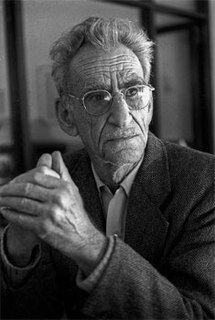A Quote by Eric Drooker
We had collaborated with Allen Ginsberg on one of his last projects just before he died in the spring of '97, a book called Illuminated Poems - it was Allen's poems and songs and I illustrated them. Or, I illuminated them with paintings and drawings that bounced off of them. You want the picture to relate to the text without it slavishly regurgitating it or merely illustrating it, because that's redundant. You want to show another angle of what the text is saying.
Related Quotes
The Beat Generation, that was a vision that we had, John Clellon Holmes and I, and Allen Ginsberg in an even wilder way, in the late forties, of a generation of crazy, illuminated hipsters suddenly rising and roaming America, serious, bumming and hitchhiking everywhere, ragged, beatific, beautiful in an ugly graceful new way.
With Orff it is text, text, text - the music always subordinate. Not so with me. In 'Magnificat,' the text is important, but in some places I'm writing just music and not caring about text. Sometimes I'm using extremely complicated polyphony where the text is completely buried. So no, I am not another Orff, and I'm not primitive.
Gas Lights - Without Oil, Tallow, Wicks or Smoke. It is not necessary to invite attention to the gas lights by which my salon of paintings is now illuminated; those who have seen the ring beset with gems of light are sufficiently disposed to spread their reputation; the purpose of this notice is merely to say that the Museum will be illuminated every evening until the public curiosity be gratified.
I've obviously used fans - I wouldn't say all my life, because we couldn't afford them when I was young, but from my 20s and onwards we've had to use fans. And I've always loathed them. Everything about them. The way you adjust them, getting them at the angle you want. Carrying them. Cleaning them. The danger of putting your finger in them.
The inspiration is all in the script, in the text. So whatever it is, either it is a film or a book to be illustrated, anything. Everything you need to know is in the text. So the thing is trying to find right tone and voice, the right style, the right way of expressing the emotions in a story or in the location of the story, but it is all in the text.





































